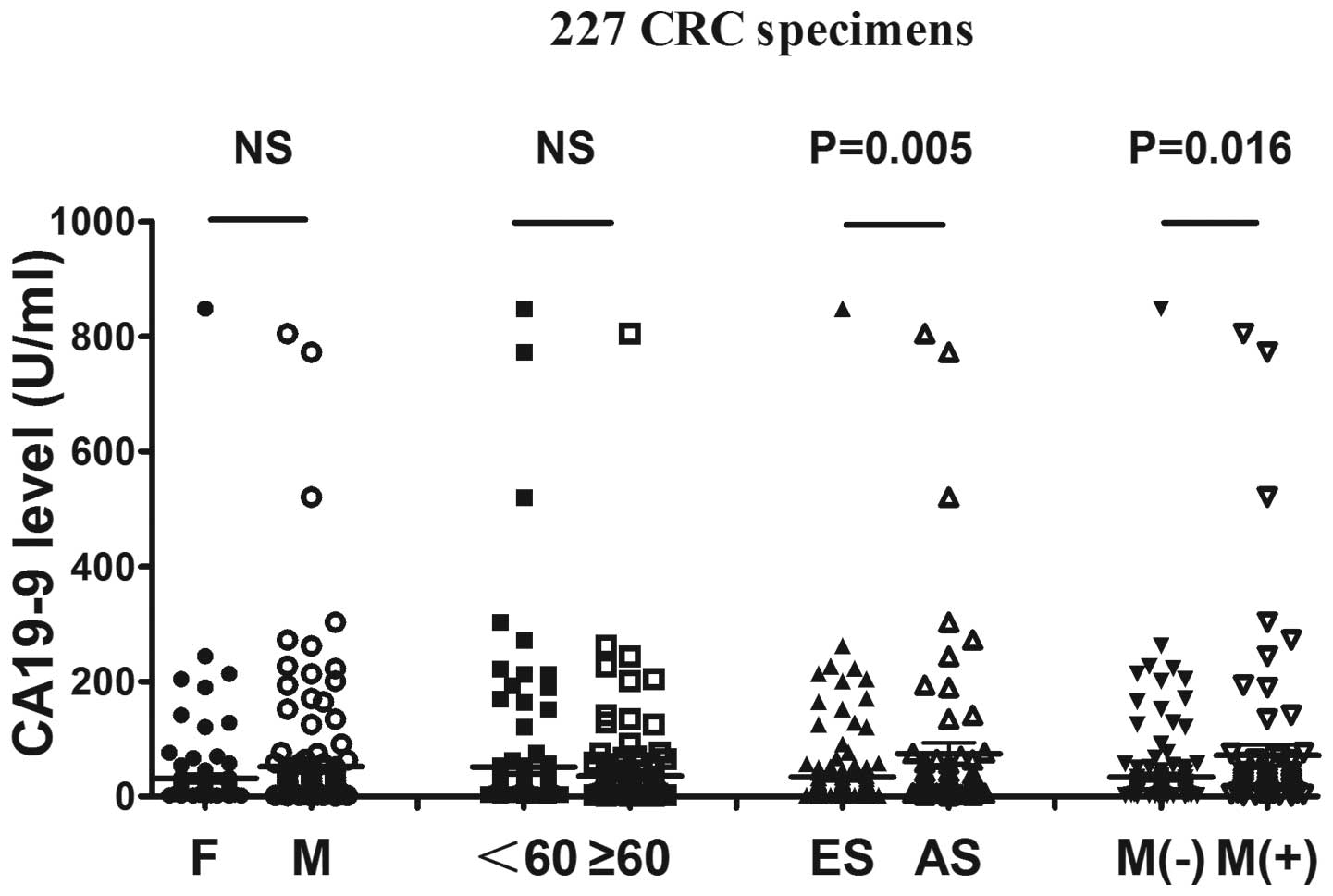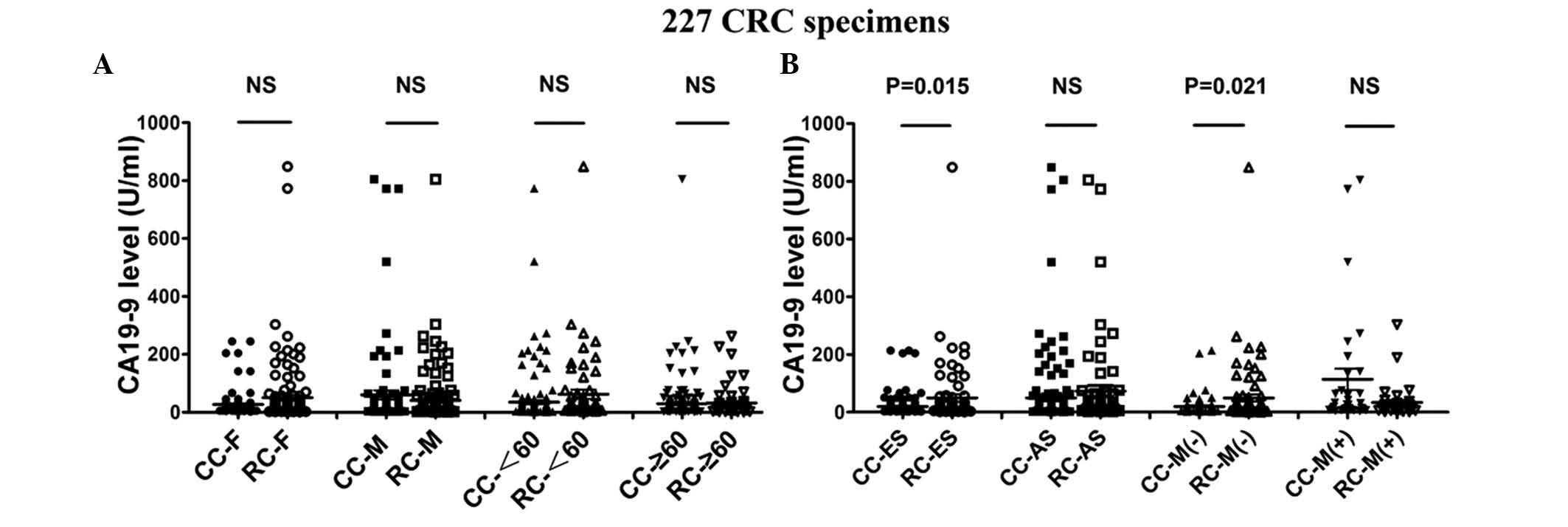|
1.
|
Weitz J, Koch M, Debus J, Höhler T, Galle
PR and Büchler MW: Colorectal cancer. Lancet. 365:153–165. 2005.
View Article : Google Scholar
|
|
2.
|
Jemal A, Bray F, Center MM, Ferlay J, Ward
E and Forman D: Global cancer statistics. CA Cancer J Clin.
61:69–90. 2011. View Article : Google Scholar
|
|
3.
|
Ludwig JA and Weinstein JN: Biomarkers in
cancer staging, prognosis and treatment selection. Nat Rev Cancer.
5:845–856. 2005. View
Article : Google Scholar : PubMed/NCBI
|
|
4.
|
Chan CC, Fan CW, Kuo YB, Chen YH, Chang
PY, Chen KT, Hung RP and Chan EC: Multiple serological biomarkers
for colorectal cancer detection. Int J Cancer. 126:1683–1690.
2010.PubMed/NCBI
|
|
5.
|
Koprowski H, Steplewski Z, Mitchell K,
Herlyn M, Herlyn D and Fuhrer P: Colorectal carcinoma antigens
detected by hybridoma antibodies. Somatic Cell Genet. 5:957–971.
1979. View Article : Google Scholar : PubMed/NCBI
|
|
6.
|
Goonetilleke KS and Siriwardena AK:
Systematic review of carbohydrate antigen (CA 19-9) as a
biochemical marker in the diagnosis of pancreatic cancer. Eur J
Surg Oncol. 33:266–270. 2007. View Article : Google Scholar : PubMed/NCBI
|
|
7.
|
Yakabe T, Nakafusa Y, Sumi K, Miyoshi A,
Kitajima Y, Sato S, Noshiro H and Miyazaki K: Clinical significance
of CEA and CA19-9 in postoperative follow-up of colorectal cancer.
Ann Surg Oncol. 17:2349–2356. 2010. View Article : Google Scholar : PubMed/NCBI
|
|
8.
|
Bast RC Jr, Ravdin P, Hayes DF, Bates S,
Fritsche H Jr, Jessup JM, Kemeny N, Locker GY, Mennel RG and
Somerfield MR; American Society of Clinical Oncology Tumor Markers
Expert Panel: 2000 update of recommendations for the use of tumor
markers in breast and colorectal cancer: clinical practice
guidelines of the American Society of Clinical Oncology. J Clin
Oncol. 19:1865–1878. 2001.PubMed/NCBI
|
|
9.
|
Duffy MJ, van Dalen A, Haglund C, Hansson
L, Klapdor R, Lamerz R, Nilsson O, Sturgeon C and Topolcan O:
Clinical utility of biochemical markers in colorectal cancer:
European Group on Tumour Markers (EGTM) guidelines. Eur J Cancer.
39:718–727. 2003. View Article : Google Scholar : PubMed/NCBI
|
|
10.
|
Gupta MK, Arciaga R, Bocci L, Tubbs R,
Bukowski R and Deodhar SD: Measurement of a
monoclonal-antibody-defined antigen (CA19-9) in the sera of
patients with malignant and nonmalignant diseases. Comparison with
carcinoembryonic antigen. Cancer. 56:277–283. 1985. View Article : Google Scholar : PubMed/NCBI
|
|
11.
|
Thomas WM, Robertson JF, Price MR and
Hardcastle JD: Failure of CA19-9 to detect asymptomatic colorectal
carcinoma. Br J Cancer. 63:975–976. 1991. View Article : Google Scholar : PubMed/NCBI
|
|
12.
|
Iemura K and Moriya Y: A comparative
analysis of the serum levels of NCC-ST-439, CEA and CA19-9 in
patients with colorectal carcinoma. Eur J Surg Oncol. 19:439–442.
1993.PubMed/NCBI
|
|
13.
|
Tan KK, Lopes Gde L Jr and Sim R: How
uncommon are isolated lung metastases in colorectal cancer? A
review from database of 754 patients over 4 years. J Gastrointest
Surg. 13:642–648. 2009.PubMed/NCBI
|
|
14.
|
Iacopetta B: Are there two sides to
colorectal cancer? Int J Cancer. 101:403–408. 2002. View Article : Google Scholar : PubMed/NCBI
|
|
15.
|
Fearon ER: Molecular genetics of
colorectal cancer. Annu Rev Pathol. 6:479–507. 2011. View Article : Google Scholar : PubMed/NCBI
|
|
16.
|
Kapiteijn E, Liefers GJ, Los LC,
Kranenbarg EK, Hermans J, Tollenaar RA, Moriya Y, van de Velde CJ
and van Krieken JH: Mechanisms of oncogenesis in colon versus
rectal cancer. J Pathol. 195:171–178. 2001. View Article : Google Scholar : PubMed/NCBI
|
|
17.
|
Weissenberger C, Von Plehn G, Otto F,
Barke A, Momm F and Geissler M: Adjuvant radiochemotherapy of stage
II and III rectal adenocarcinoma: role of CEA and CA 19-9.
Anticancer Res. 25:1787–1793. 2005.PubMed/NCBI
|
|
18.
|
Hinoue T, Weisenberger DJ, Lange CP, Shen
H, Byun HM, Van Den Berg D, Malik S, Pan F, Noushmehr H, van Dijk
CM, Tollenaar RA and Laird PW: Genome-scale analysis of aberrant
DNA methylation in colorectal cancer. Genome Res. 22:271–282. 2012.
View Article : Google Scholar : PubMed/NCBI
|
|
19.
|
Birkenkamp-Demtroder K, Olesen SH,
Sørensen FB, Laurberg S, Laiho P, Aaltonen LA and Ørntoft TF:
Differential gene expression in colon cancer of the caecum versus
the sigmoid and rectosigmoid. Gut. 54:374–384. 2005. View Article : Google Scholar : PubMed/NCBI
|
|
20.
|
Cui H, Cruz-Correa M, Giardiello FM,
Hutcheon DF, Kafonek DR, Brandenburg S, Wu Y, He X, Powe NR and
Feinberg AP: Loss of IGF2 imprinting: a potential marker of
colorectal cancer risk. Science. 299:1753–1755. 2003. View Article : Google Scholar : PubMed/NCBI
|
|
21.
|
Jorissen RN, Gibbs P, Christie M, Prakash
S, Lipton L, Desai J, Kerr D, Aaltonen LA, Arango D, Kruhøffer M,
Orntoft TF, Andersen CL, Gruidl M, Kamath VP, Eschrich S, Yeatman
TJ and Sieber OM: Metastasis-associated gene expression changes
predict poor outcomes in patients with Dukes stage B and C
colorectal cancer. Clin Cancer Res. 15:7642–7651. 2009. View Article : Google Scholar
|
|
22.
|
Dunican DS, McWilliam P, Tighe O,
Parle-McDermott A and Croke DT: Gene expression differences between
the microsatellite instability (MIN) and chromosomal instability
(CIN) phenotypes in colorectal cancer revealed by high-density cDNA
array hybridization. Oncogene. 21:3253–3257. 2002. View Article : Google Scholar
|
|
23.
|
Ahlquist DA, Skoletsky JE, Boynton KA,
Harrington JJ, Mahoney DW, Pierceall WE, Thibodeau SN and Shuber
AP: Colorectal cancer screening by detection of altered human DNA
in stool: feasibility of a multitarget assay panel.
Gastroenterology. 119:1219–1227. 2000. View Article : Google Scholar : PubMed/NCBI
|
|
24.
|
Frattini M, Balestra D, Pilotti S,
Bertario L and Pierotti MA: Tumor location and detection of k-ras
mutations in stool from colorectal cancer patients. J Natl Cancer
Inst. 95:72–73. 2003. View Article : Google Scholar : PubMed/NCBI
|
|
25.
|
Li FY and Lai MD: Colorectal cancer, one
entity or three. J Zhejiang Univ Sci B. 10:219–229. 2009.
View Article : Google Scholar : PubMed/NCBI
|
|
26.
|
Sanz-Pamplona R, Cordero D, Berenguer A,
Lejbkowicz F, Rennert H, Salazar R, Biondo S, Sanjuan X, Pujana MA,
Rozek L, Giordano TJ, Ben-Izhak O, Cohen HI, Trougouboff P, Bejhar
J, Sova Y, Rennert G, Gruber SB and Moreno V: Gene expression
differences between colon and rectum tumors. Clin Cancer Res.
17:7303–7312. 2011. View Article : Google Scholar : PubMed/NCBI
|
|
27.
|
Wang WS, Lin JK, Chiou TJ, Liu JH, Fan FS,
Yen CC, Lin TC, Jiang JK, Yang SH, Wang HS and Chen PM: CA19-9 as
the most significant prognostic indicator of metastatic colorectal
cancer. Hepatogastroenterology. 49:160–164. 2002.PubMed/NCBI
|

















